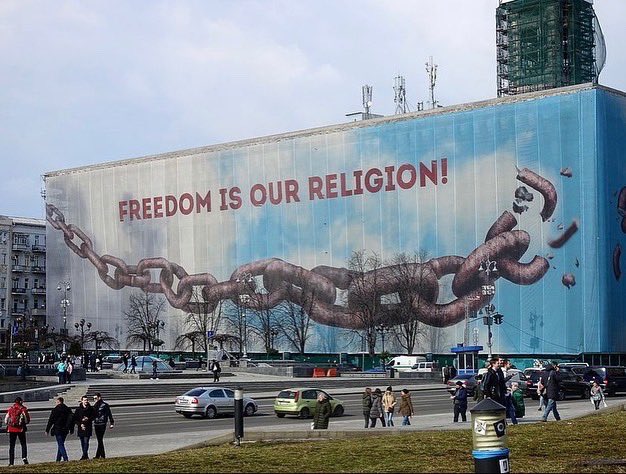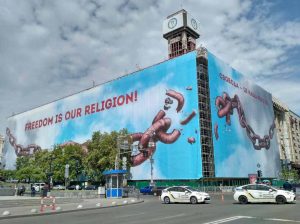

The day before the Russian invasion, someone posted a 2017 photo of a Trades Union building in Kyiv at #StandwithUkraine. (See above.) While no-one would deny complexities of Europe’s geo-political games, the slogan on the façade of that building brings home one simple truth behind Ukrainian defiance. Don’t be bamboozled by rants about Western aggression or raps of crackpot realists on the left and right out to convince you war on Ukraine is due to Putin’s special sense of historical grievance and sincere concern for Russian security. No doubt Putin was maddened by vague talk starting in the 00s about Ukraine joining NATO, but you’ll miss what’s at stake Over There if you treat his invasion as a legit (or unhinged) response to the prospect of NATO maneuvers on his border in some cloudy future. What Putin hates are Ukrainians who act like they’re free now, since he won’t forget his “little brothers” (and their grandmothers) were once subjects of an empire whose dissolution he regards as a great tragedy of the 20th C.
To think straight about the struggle in Ukraine, it may help to look backward (like the Angel of History) along with the late Russian writer Vasily Grossman, who once posed a question that nailed the Soviet Union’s legacy:
Did Lenin ever imagine that what his revolution would liberate was slavery itself—that his revolution would enable Russian slavery to spread beyond the confines of Russia to become a torch lighting a new path for humanity?
Grossman made a case against the Soviet model of “modernization through non-freedom” in Everything Flows—his last word on the state of his nation. He composed his hybrid novel/polemic between 1955-1962 and his argument needs an update since it’s China’s post-M-L spectacle of illiberal growth that has the most juice in the world today. Still, in both Russia and China, progress means Reaction. And as another night falls on Kyiv with a Russian army convoy parked outside the city, Putin is non-freedom personified.
Grossman invented a quiet Russian “Ivan” in Everything Flows—ex-Zek and exemplar of humane urges—who starts to think his way out of his country’s slavishness after his first post-Gulag visit to the “world city” of Moscow:
During the thousand years of her history Russia had seen many great things. During the Soviet period the country had seen global military victories, vast construction sites, whole new cities, dams across the Dnieper and the Volga, canals joining different seas. The country had seen mighty tractors and skyscrapers…There was only one thing Russia had not seen during this thousand years: freedom.
That thing’s on his mind when he meets proud trucklers who managed to stay out of the camps:
there is only one power in the world before which it is good and wonderful to feel that you yourself are small and weak. But Ivan Grigoryevich’s mother had died long ago…
Ivan muses on how his idea of freedom has grown as he matured:
I used to think that freedom was freedom of speech, freedom of the press, freedom of conscience. But freedom needs to include all of the lives of all of the people. Freedom is the right to sow what you want. It’s the right to make boots or shoes, it’s the right to bake bread from the grain you’ve sown and to sell it or not sell it as you choose. It’s the same whether you’re a locksmith or a steelworker or an artist—freedom is the right to live and work as you wish and not as you’re ordered to. But there’s no freedom for anyone—whether you write books, whether you sow grain, or whether you make boots.
Ivan reviews his history in and out of the Gulag, sorting through classes of Zeks, before focusing on how prisoners in general tend to get frozen in the time that “engendered” them, while people living in freedom—even elderly ones—are less stuck on the past. The weight of Ivan’s past won’t allow him to float with the flow of events into the future, yet he’s not entirely shut out of the present. His working class job and modest domestic life—warmed by a brief romance—deepen his deeply unbourgie humanism. Ivan’s sense of freedom is neither class-bound nor basely materialistic:
People’s small, everyday struggles, the efforts made by workers to earn an extra ruble by moonlighting, the peasants’ natural desire to fight for some of the bread and potatoes they had themselves grown—all this represented not only the wish for a more comfortable life, not only the wish to feed and clothe one’s children well. The struggle for the right to make boots, to knit a cardigan, to sow what one wants to sow—all this was a manifestation of man’s natural and indestructible aspiration toward freedom. This aspiration was, he knew, no less indestructible in the souls of the zeks. On either side of the barbed wire freedom seemed immortal.
On either side of the grave too. Bless that 25 year Ukrainian soldier who gave his life blowing up a bridge that halted the Russian advance and those border guards who will talk back forever to invaders:
“I am Russian warship…”
“Go fuck yourself.”
True stories of heroism enable a free people to keep their faith.
II
Pure horror stories, OTOH, only fire up crazies. Though an MSNBC general ascribed Ukraine’s last week of heroics to a longstanding hatred of Russia, which he backdated to Stalin’s campaign against “Kulacks” and the Terror famine of 1932-33. In the mind of this talking head, deaths of more than three million Ukrainian peasants now had an Up ending. But nobody who reads Everything Flow’s killer chapter on the Famine could imagine it was a nation-builder. In the novel, Ivan’s lover, Anna, recalls the Kulacks’ End and the Terror which she witnessed as a semi-protected minor party functionary. She tells how she saw a young girl growl like a dog to keep others away as she gnawed on a wooden table leg. Humans went cannibal during the Famine. Mothers were driven to eat their infants (even as others kept telling their children fairy tales as they died trying to make them forget their hunger). That 21 C. pundit did dirt on Ukrainian resistance when he rooted it in the Famine. Anna (and Grossman) knew there were no positive takeaways from mass murder by starvation. What remained was the stench…
I learned later that troops were sent in to harvest the winter wheat—but they weren’t allowed to enter the dead village. They camped in their tents. There were told there’d been an epidemic. They kept complaining, though, about the terrible smell from the village. The troops also sowed winter wheat for the following year. And in the spring settlers were brought in from Oryol Province. This was, after all, the Ukraine. It was Black Earth—and the Oryol has always been a land of bad harvests. The women and children were left in shelters by the station, and the men were taken into the village. They were given pitchforks and told to go around the huts and drag out the bodies. The dead were just lying there, men and women, some on beds and some on the floor. The smell in the huts was awful. The men tied kerchiefs over their mouths and noses and began dragging out the bodies—but the bodies just fell apart. Finally, all the bits of bodies were buried outside the village. That’s when I understood that was indeed a “cemetery of a severe school.” Once all the corpses were gone, they brought in the women to clean the floors and whitewash the walls. Everything was done properly, but the smell was still there. They whitewashed the walls a second time and spread new clay on the floors, but the smell still wouldn’t go away. They couldn’t eat in those huts, and they couldn’t sleep in those huts; they all went back to Oryol. But still, earth like that doesn’t stay empty and unpeopled for long. How could it?
Anna didn’t spend all her time in the countryside during the Famine. She spent a few days in Kyiv where peasants had managed to get by roadblocks meant to keep them out of the city.
[P]eople were getting to Kyiv, crawling through fields and bogs, through woods and open country—anything to bypass the roadblocks…The peasants could no longer walk—they could only crawl. And so people in Kyiv would be hurrying about their affairs—on their way to work, on their way to a cinema…Trams would be running…And in the middle of all this, crawling among these people, were the starving. Children, men, young girls—all on all fours.
Anna’s memory of disjunction—of crawling country folk and walkers of the city—underscores the wonder of this moment in Kyiv. Broadscale human solidarity is rare yet its palpable there now. Professors and male strippers patrol streets together while teenagers and grandmothers make Molotov cocktails. I’m reminded just now of a line of Grossman’s: “In this [Soviet] state, there is no such thing as society.” That sounds like something Margaret Thatcher once said. But when it came to social living (and social democracy) she was a contra. Grossman, by contrast, affirms common life as he gets to the bottom of human relations in the Soviet Union.
Society is founded on people’s free intimacy and free antagonism—and in a state without freedom, free intimacy and free hostility are unthinkable.
Which brings us back to Lenin. He knew what might happen if he went with his emotions. Think of how he tuned in to Beethoven’s “Appassionata.” But…
I can’t listen to music very often, it affects my nerves. I want to say sweet, silly things, and pat the little heads of people who, living in a filthy hell, can create such beauty. These days, one can’t pat anyone on the head nowadays, they might bite your hand off. Hence, you have to beat people’s little heads, beat mercilessly, although ideally we are against doing any violence to people…
Plenty of American leftists seem to share Lenin’s wish to avoid unnerving feelings. Their line on the Ukrainian people’s struggle hints they’re scared “to say sweet, silly things, and pat the little heads of people.” Take a glance at the official statement of Democratic Socialists of America on “The Russian Invasion of Ukraine”: “We stand in solidarity with the working classes of Ukraine and Russia who will undoubtedly bear the brunt of this war…” And, ICYMI, they’re worried the invasion “severely threatens the livelihoods and well-being of working-class peoples in Ukraine, Russia, and across the region.” But the struggle in Ukraine is not a class struggle. It’s the whole body of the people who are fighting this war. DSA, though, go out with a final flail: “No war but class war.” That means they are, objectively, against the Ukrainian people. DSA have also reaffirmed their Trumpy call for America to withdraw from NATO just as member states of that Western alliance have stepped up their support for Ukraine and hit Russia with severe sanctions.
While it’s more vital to identify with Ukrainians who have picked up guns than with government officials and businessmen who are putting the squeeze on Russia from a safe distance, we should be glad people of all kinds and conditions have freely chosen to do the right thing lately. Yet DSA (et al.) won’t pat anyone on the head unless they pass a class litmus test. Like Lenin, they shall not be moved. Like him and Putin, they’re enemies of the people.